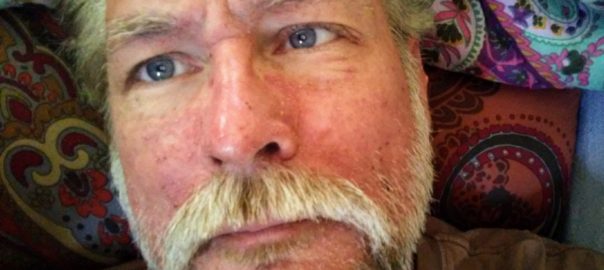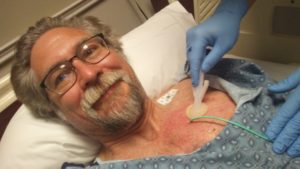I have tried to gather a few different perspectives on what it feels like to die or go through the process of dying, including my lengthy interview with Michael March just prior to his death not long after I met him online. Below, I present a different perspective entirely from Claire Wineland, a Cystic Fibrosis patient who had been advocating about her disease for quite some time. It is a video I found on YouTube that she uploaded a while back, explaining her own experience with technically dying on a number of occasions from complication arising from her disease. Continue reading Dying, Redux
Tag Archives: Positivity

Week One: The Oozing Begins
I am now into the third month of my clinical trial for poziotinib. After the first two months, I had to take two weeks off for recovery from the rash it gave me. I am, however, glad to be back on the drug for the very simple reason that it was effectively killing the cancer within me. That is not a claim I make lightly, or, sadly, have had reason to make much at all over the past year.
When I was first put on chemotherapy back at the end of 2014, it was because there were no targeted therapies or immunotherapies available, either on the market or through clinical trials, that were likely to work for me. Chemo seemed to be the only option and, in some ways, it felt like a last-ditch effort. My tumor was considered inoperable, the metastasis had spread too far and wide, and radiation was not even being presented as an option.
While I was primed for a limited response and the possibility that I might only get a few months extension from the process, it turned out that chemo kind of worked for me. It worked well enough, in fact, that I would stay on it for over two and a half years — most of that time, simply keeping the cancer growth in stasis. There was talk of the possibility of being on that drug for five or more years at one point, but not long after the two-year mark I began to notice small changes in my scans. Very small, but changes, nonetheless. Continue reading Week One: The Oozing Begins

This Is Not My Body
Crouched over the kitchen sink, I surged with a repressed groan, stifling the convulsive impulse as tears broke free; I cried, uncontained, momentarily unaware why. I was so used to keeping it in, I had become disconnected from what I was actually feeling — ironic, because what I was feeling right then was disconnected.
I did not recognize my body. This vessel in which I was contained made no sense to me at all. It responded to my thoughts and commands, but it felt completely foreign. Looking down at my arms, my hands, my fingers, I recognized nothing. They could hold the dishes I was washing, turn the knob on the faucet, even scrub with the brush. But there was a clumsiness about them, an awkwardness that was hard to explain or rationalize, except to know immediately that none of that was part of my body. None of it was Me.
Such is the effect of bodily changes that occur under cancer treatment. I was experiencing a slight case of dysmorphia, that feeling of certainty that you are not in the right body. It passed, but the emotional impact lingered. Continue reading This Is Not My Body
Endurance and Payoff
I have friends who are long distance runners and I have watched them struggle through their pain to achieve their goals. Although I used to train for both cross country and track way back in middle-school, I can no longer run. But I do understand a thing or two about the process. And I appreciate what it means to endure hardships in search of a personal reward.
Beginning a Clinical Trial

At the end of May, I began participating in a clinical trial for Poziotinib, a new targeted therapy that works on mutations in the EGFR and HER categories. Naturally, within days of my May 23rd start, I had already begun exhibiting side-effects from the new medication. The resulting rash has persisted and spread, morphing into a completely new experience for me. I thought at the time that the minor ordeal I had in preparing for the clinical trial would have been the biggest challenge of the trial itself: first I went in for a “simple” needle biopsy procedure, then I had to stay to deal with the effects when things did not go exactly according to plan. The experience even inspired an opinion piece for the Philadelphia Inquirer. But I passed over that (still relatively minor) road bump and ran headlong into the clinical trial and resulting crash back into Rashville.
Having a rash does not sound all that bad in the grand scope of things. A little salve, a dollop of willpower, and it should be easy to weather. Itching too much? Slip on some gloves or spray it with lidocaine. Rashes pass. At least it is not nausea or debilitating pain or sleeplessness. Well, at least it is not nausea. Continue reading Endurance and Payoff
Emotional Illness
Let’s get one thing straight: emotions do not cause disease. The fault of your physical illness very likely lies with something other than you. The whole notion that anything from kidney stones to cancer could be traced back to an emotional block, repressed anger, wrongs un-righted, or any other random psychological hurt from this life or a past one, is so corrupt that it should never be given credence by any rational being. Yet throngs of people with well-intentioned sounding titles like “life coach” or “healer” spread these malicious little bits of victim blaming as if they were offering salvation in a bottle of snake oil.
That said, I want it to be clear that not everyone who identifies as a healer is guilty of either victim blaming or willfully misleading those who they are trying to help. I’ve known incredibly sincere, warm, compassionate people who do their absolute best to improve the health and well-being of others through a wide swath of tools and approaches, arguably with strong results. And, frankly, many people need some form of guidance in their lives and have relied successfully on many such “coaches” to get where they need to be. I’m not condemning whole industries or forms of practice or even job titles here; this isn’t about valid occupations, but rather about those who choose to exploit the fears and insecurities of patients under the guise of offering miraculous cures through attitude adjustment. Continue reading Emotional Illness
Hollywood and Cancer, Honesty vs a Lazy Sentimental Tool
Sometimes, Hollywood gets it right. There are a few films and television shows that have nailed the patient or caregiver experience quite well. More often than not, however, Hollywood uses Cancer (in the broadest sense) whenever it needs to cue a terminal illness to create sympathy without the need for exposition, or force sentimentality when character development and theme are not enough to dredge up a true emotional response.
This problem is far from new. Hollywood has long used a heavy hand to manipulate the audience. And shorthand is often required to tell a story in the confines of two hours or less. Rarely does cancer show up in a motion picture as a fully formed subject, driving the plot on its own or acting as a subplot with any sense of realism or sincerity. It is an issue that has bothered me since I began my own treatment and stumbled into a series of movies in which cancer was a mere tool for pushing emotional buttons, sometimes callously, frequently gratuitously. Warning: spoiler alert — I am probably going to ruin a few surprise plotlines in the coming paragraphs. Continue reading Hollywood and Cancer, Honesty vs a Lazy Sentimental Tool
Recent Posts and Updates
Because I am sometimes spread more thinly than others across the social media spectrum, I need to add in one of these aggregate posts to link over to articles you might have missed because they were not posted here on my blog. In order to maximize my ability to target other patients and caregivers, I have published quite a lot on LungCancer.net while reserving the space here on my blog for more personal or passionate material.
While I hope that my readers are keeping up with the wider range of my work and social comments either by following my author page on Facebook or reading my Twitter feed, it is still easy to miss new material in these over-saturated times.
So, without further ado, here are links to some of my recent material you might have missed. Don’t forget to option-click so that these links open in a new tab, making it easier to come back to this page for more clickety-clicking fun! Continue reading Recent Posts and Updates
Another New Beginning
The Overstayed Welcome
We all know — or we should all know — that lung cancer is one of the biggest killers in our society. With an estimated average of 433 people dying every day from some form of this disease, there is no question as to why it is considered such a horrifying diagnosis. Lung cancer kills more than any other cancer, and more than its three closest competitors in the cancer arena combined. If there were cancer cage matches, lung cancer would win virtually every time based on the sheer volume of its devastation and mayhem. Yet, in spite of receiving only a fraction of the research funding that other cancers get, a surprising number of treatments have emerged to help lung cancer patients outlive their initial prognosis.
But you have lung cancer! You’re expected to die. And, by the way, you’re expected to die quickly (and brutally). That is what the common narrative tells us.
Lung cancer treatment has made amazing bounds over the past decade. For a growing number of patients, living with Stage IV lung cancer is no longer an immediate death sentence, if a death sentence at all. For some of them, especially those diagnosed “earlier” in the Stage IV spectrum, while there are still a few months to alternate between treatments to find what works, or for those lucky enough to have an actionable mutation, even this advanced type of lung cancer can be treated as a chronic illness instead of a fatal one. Earlier and better diagnoses have led to younger and healthier patients having a chance to engage in this challenge before their cancer has beaten them down from within, and they have brought a new level of perseverance to the process. Continue reading The Overstayed Welcome
Feeling Defeated
Everybody has days like this sometimes.